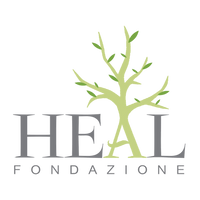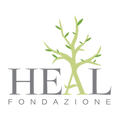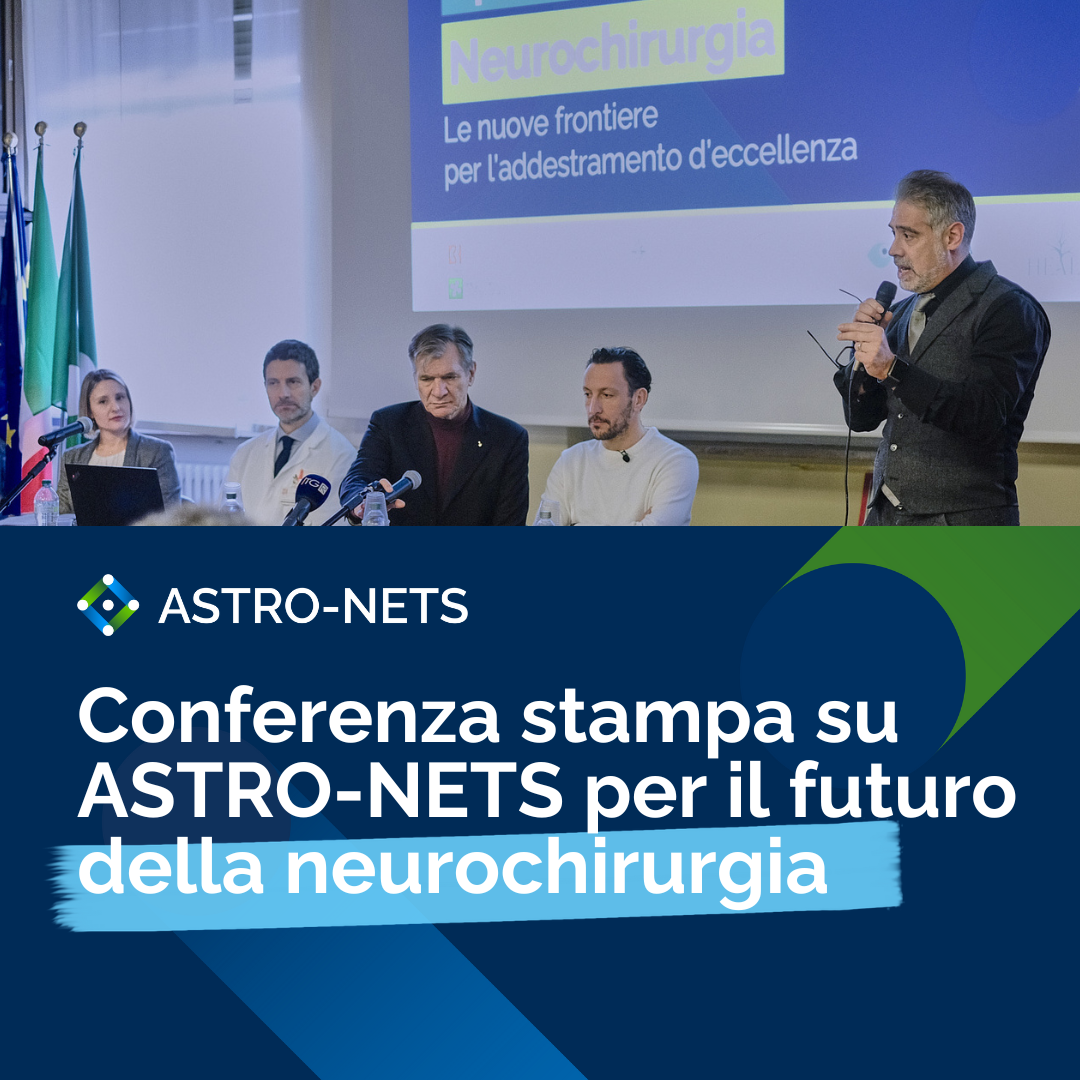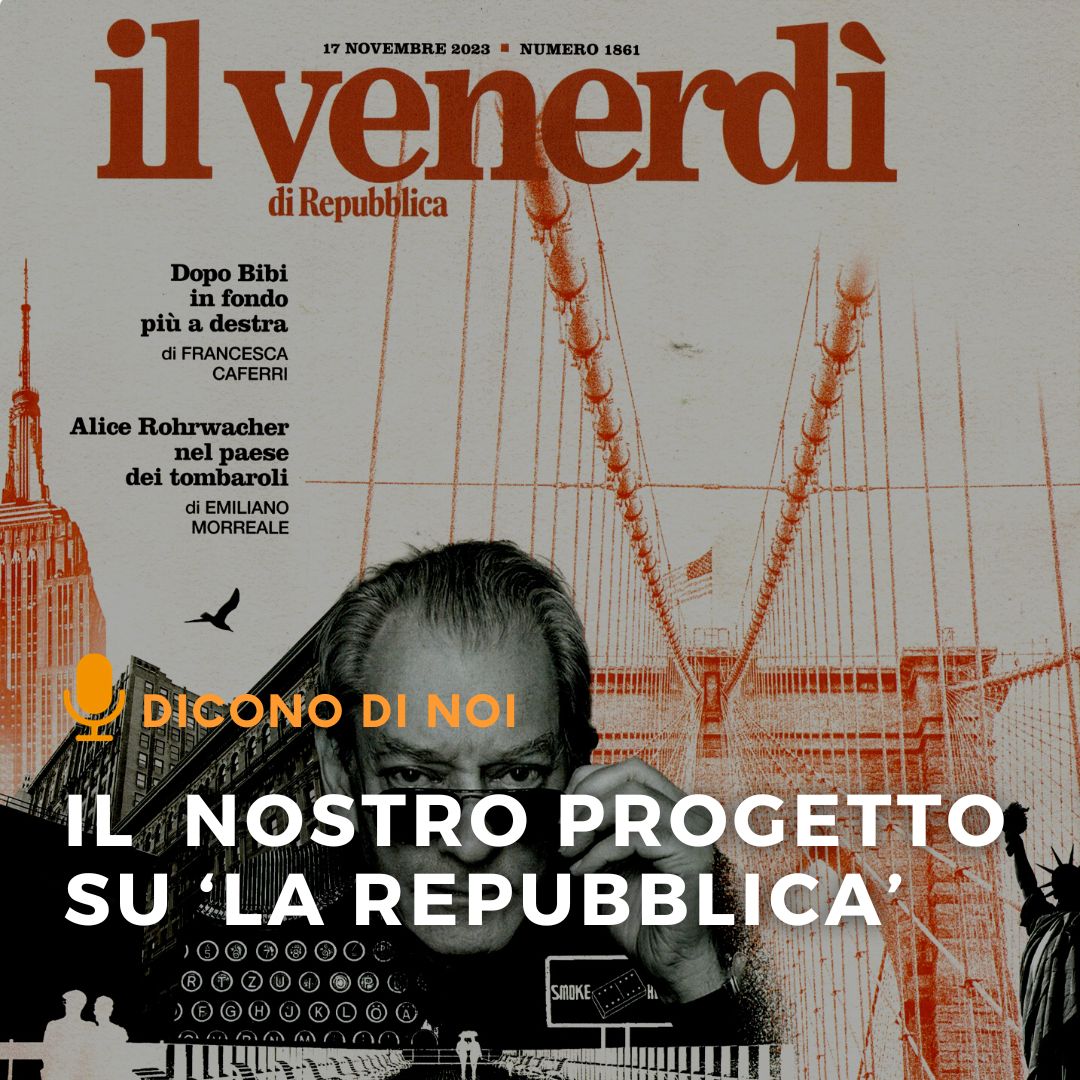We officially presented the ASTRO-NETS project
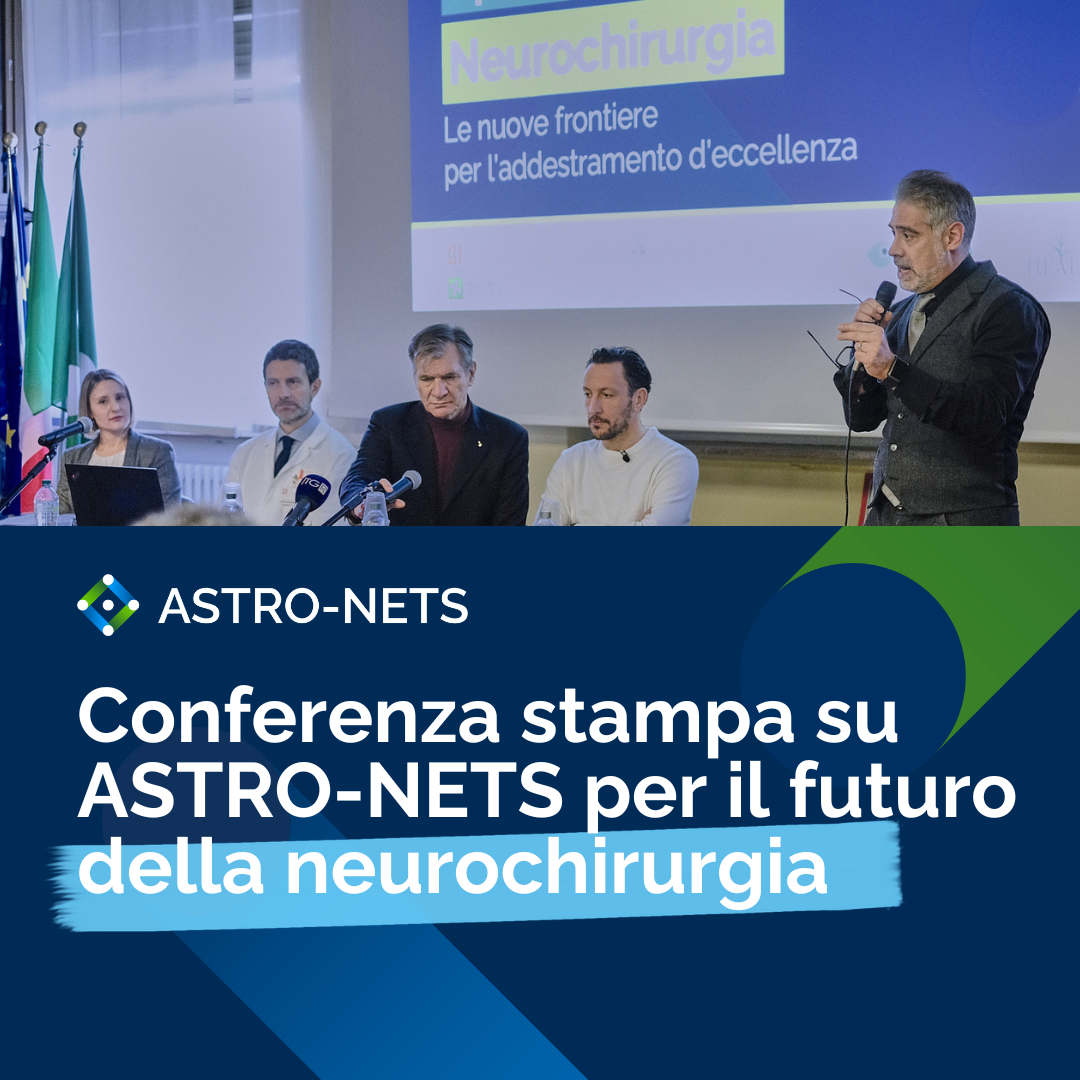
In the operating room as on a spaceship, ready for any eventuality, prepared to face emergency situations, but always focused on the patient: this is how the students of the Neurosurgery Specialization School directed by Professor Francesco DiMeco, director of the Department of Neurosurgery of Besta , will prepare to become the neurosurgeons of the future thanks to the ASTRO-NETS Project , presented at a press conference in the “Renato Boeri” library of the IRCCS Istituto Neurologico Carlo Besta Foundation. ASTRO-NETS leverages methodologies and lessons learned from astronaut training to improve and innovate the training of neurosurgeons, with a particular focus on developing soft skills and managing complex, high-risk situations .
Present at the press conference, as guest of honor and testimonial of the project, the internationally renowned Italian astronaut Paolo Nespoli, remained in space for 313 days, 2 hours and 36 minutes during the three missions of 2007, 2010-2011 and 2017.
Nespoli shared his experience with the organizers of the project: at the speakers' table, together with the Professor Francesco DiMeco, Doctor Alessandro Perin, neurosurgeon of the Beast And Scientific Director of the NeuroSim Center , a cutting-edge neurosurgical simulation center; Simone De Biase, founder of Heal Foundation which finances and promotes the project by committing itself to the development of research in the fight against brain tumors; Simone Pozzi and Vanessa Arrigoni, CEO and Lead Consultant respectively Of Deep Blue , a company specialized in Human Factors and Safety, with experience in the aviation and space sectors.
Project objectives: to train excellent neurosurgeons, providing them with the necessary theoretical and technological tools for working in the operating room, such as A neurosurgical simulator , to approach each type of operation with greater awareness and create a hub of information and case studies from which neurosurgeons can draw, comparing theories and surgical techniques. This way, training will be a dynamic process, continually informed by new data obtained directly in the field.
The project training, which will last twelve months, will address the issues of Communication, Teamwork, Leadership, Conflict Management, Self Care, Human Error and Multicultural Factors.
The link between the training of astronauts and that of neurosurgeons lies in the application of advanced and innovative training techniques and approaches and is based on some key elements: high-risk environments , Immersive experience-based training to develop key skills such as teamwork, communication, problem-solving, decision-making, and stress management in a hostile environment; simulators and advanced technologies; non-technical skills training; and adapting to unexpected situations.
Thanks to the technological advances we've been witnessing in recent years, contemporary reality is constantly evolving. Consider, for example, virtual or augmented reality and artificial intelligence. It's natural to think of professional training approaches that keep pace with the times, leveraging all available technological tools to foster the acquisition of excellent technical skills. Hence the development of simulation tools, both physical and virtual, that allow the development of the best technical expertise without jeopardizing the patient's safety. Professor DiMeco stated At the same time, in the face of hyperbolic technological expansion, there is a growing need to rediscover a new humanism, one that emphasizes the professional's interpersonal and behavioral skills, both with colleagues and, especially, with patients. Hence the need to also focus on so-called "non-technical" skills. The Astro-Nets project aims for this integrated training model, transferring the experience already gained in the aerospace sector to an inherently high-tech context, such as neurosurgery and academia, naturally devoted to training and experimentation.
“ In this journey, the astronaut and engineer Paolo Nespoli has been a precious source of comparison – then he explained by Dr. Alessandro Perin -. With him and thanks to his great experience, supported by Deep Blue we shared the discussion table on the project and created ASTRO-NETS . We want to understand whether neurosurgeons can benefit from "comprehensive" training, as astronauts and airplane pilots already do. It is no longer acceptable to train doctors, including neurosurgeons, through an apprenticeship that involves trial and error. When we board a plane, we don't wonder who the pilot is, what he looks like, or whether he's qualified; we trust, without doubt or fear. We want this to happen one day for patients facing health problems and surgery. This goal will only be achieved when the training system for doctors and surgeons is standardized and harmonized. We hope that ASTRO-NETS will allow us to continue this journey toward the goal of "100% safety."
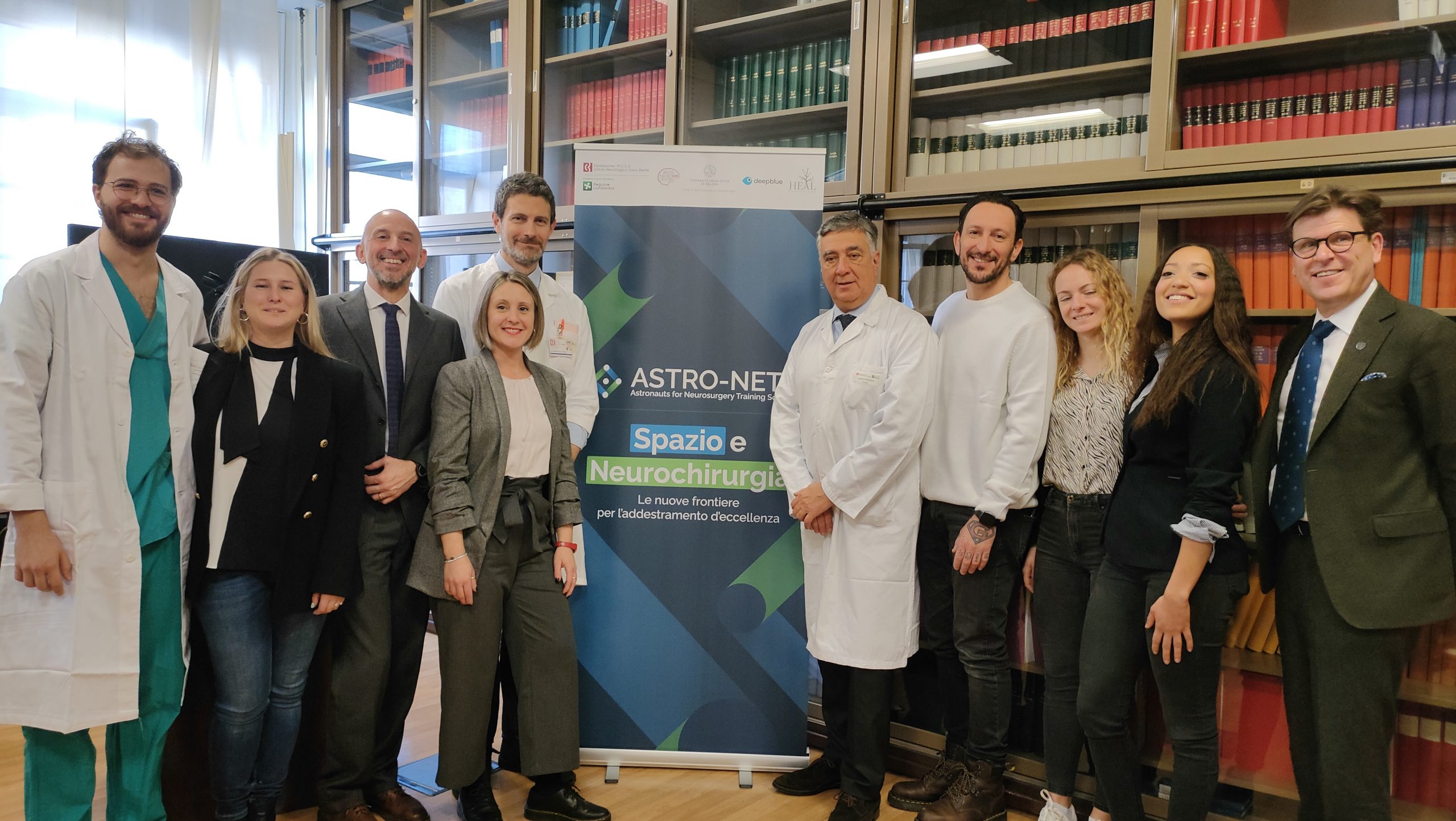
“ During the various phases of the space missions, including the launch, I never felt fear because I was aware of both the preparation of the other team members who were with me on the spacecraft or in the ground support centers, and of my level of personal and professional preparation. – declared engineer Paolo Nespoli -. As a patient, I trusted the expert neurosurgeons at Besta without fear, having complete confidence in their training and professional abilities. For this reason, I believe it is essential for young neurosurgeons to take this course in order to acquire the necessary personal and professional preparation .
With them too Simone De Biase, founder of the Heal Foundation . “ What drew me to and made me passionate about this project – he added De Biase – This is Professor Alessandro Perin and Professor Francesco Di Meco's approach to training and knowledge sharing. In Italy, there has always been a tradition of passing on one's knowledge to a chosen one, a protégé, thus the result of a personal selection process. DiMeco and Perin's approach, however, is a totally democratic one, as it should be, and it is a revolutionary aspect applied to Italy. Furthermore, but not secondarily, I really like the combination of the unexplored universe of neuroscience and the unexplored universe of astronomy that ASTRO-NETS encompasses .
Simone Pozzi , CEO and Trainer And Vanessa Arrigoni , Lead Consultant and Trainer for Deep Blue , concluded: “ Deep Blue has extensive experience in the aviation and space sectors. We have conducted training projects in these fields, always valuing the synergy between technical and non-technical skills. Now, with Astro-Nets, we want to draw inspiration from this long and fruitful work to begin building a similar path for young neurosurgeons. They often begin their specialization by moving from the book to the hospital, and this destabilizes them. They find themselves having to work in a team, but they have no experience, and there is no structured path with specific objectives. We try to help them develop teamwork skills, an area they are not well-equipped for, to learn how to best work with colleagues, using all the resources to do their job to the fullest. Or even to make themselves available to others when the situation requires it. And then, in dealing with critical situations, to transform them into sources of individual and group learning, and be better prepared next time.”
Press release of January 23, 2024
